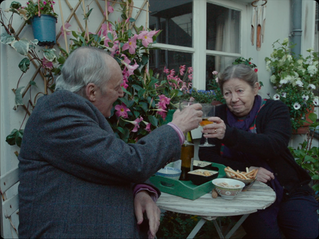It’s Impossible to Learn to Plow by Reading Books
- Jonny Rogers
- Dec 7, 2021
- 3 min read
Richard Linklater, 1988

Near the beginning of Before Sunrise, Jesse describes an idea for a TV show: a year long project featuring 365 people recording every detail of their lives for 24 hours, “capturing life as it's lived.” While Linklater has yet to realise such an idea, his little-known feature debut offers an insight into what this might have looked like: It’s Impossible to Learn to Plow by Reading Books was first shown on public-access television in 1988, offering residents of Austin an 86-minute minimalist journey across America through the eyes of a young man, played by Linklater himself.
Like many of his films, Plow is as aimless and meandering as its protagonist, though whether or not such is a virtue or weakness is down to the viewer’s discretion. His goals and ambitions are opaque, if existent at all, and he appears to respond to all events and encounters with the same inexpressive apathy. He hardly speaks a word, and even then his most intelligible lines are simply quotations from literature. At one point, he holds a gun up against a window, but the film reassures us that he is not a violent man.
Perhaps the film’s sparse emotional stimulation stems from Linklater’s lack of experience in filmmaking (his later films, assuredly, boast considerable technical improvement); or perhaps he simply wanted to capture a sense of dis-ease and alienation familiar to post-war generations. While the rise of globalisation has enabled people to traverse the world in ever shorter periods of time, it has also meant that more time is spent in transit, inhabiting the anonymous non-places of airports and train stations. As we see throughout the film, many forms of human interaction have been supplanted by technology, even prior to the widespread domestication of the internet: customers interact with transportation conglomerates through ticket machines, and staff rehearse pre-written scripts to unseen audiences through a network of speaker phones.
Who can fault the inarticulate when speech has become optional; when text supersedes language? Why piece together your own ideas when countless books already possess a precision and clarity you could never achieve?

This protagonist - a symbol, presumably, of all those who feel lost and dejected - appears more comfortable in the company of strangers than his own family. As Linklater travelled across the country with a vague plan for what this project might become, he weaved in the real stories of those he encountered along the way: a hairdresser staying overnight in an airport lobby, a McDonald's employee handing out tapes to customers he found interesting, and so forth. Like its successor, Slacker, Plow is an ode to those who fall between the gaps. Why should films only focus on lives which neatly fit into some dramatic trajectory when so few of us, if any, experience such certainty day-by-day?
Where many filmmakers preach that you should be confident, determined, uncompromising, and relentlessly self-assured, Linklater quietly mumbles, ‘You’re okay as you are.’ To those who resist categorisation, or who stand in defiance of the secular virtues - wealth, success, ambition, progress - Plow insists, ‘It’s okay not to know who you are.’
This valorisation of the nobody, however, is not contingent on the iconoclasm of stardom; the film even lingers on the obituary of Sterling Hayden, a leading star of western and noir films in the 1950s and 60s. Throughout his career, Linklater has worked with unknown actors and household names alike, even kickstarting a few prolific careers in the process. Linklater clearly loves cinema in all its variety, drawing inspiration from both classic Hollywood and arthouse alike; but he is also aware that melodrama and action fall short in their veneration of certain emotions and experiences over others. After all, life is all far richer than the moments we remember.

In a certain sense, Linklater’s entire filmography has continued to dismantle the presupposition that only certain experiences or lifestyles are valuable, instead creating a space to present the ordinary as worthy of wonder and appreciation; to give the ‘extras’ of the world a moment in the spotlight. While Linklater would take this adulation of the mundane to new heights in Waking Life, Boyhood and the Before trilogy, Plow shows that this idea is present at the very beginning of his career. As he explains in the director’s commentary:
“If you can find some joy or some poetry or something kind of beautiful about the banal things and everything else, then you’re much more set just to see the world. What I strive for is to be excited about brushing your teeth or all the crap you have to do in life, because that is your life.”








Comments